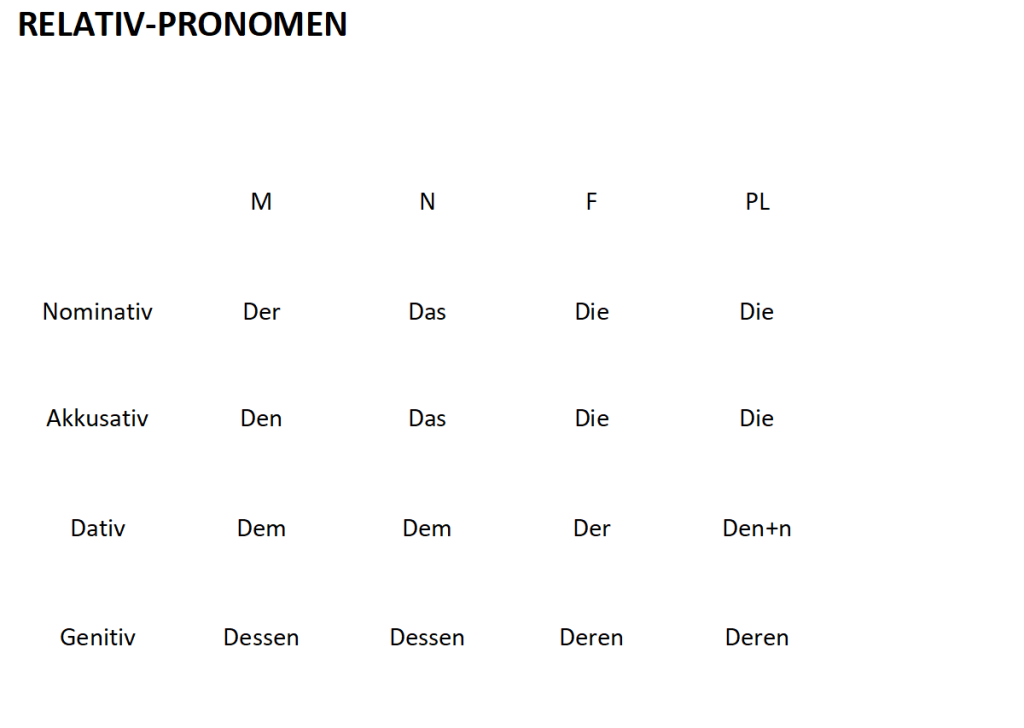The session started with solving the doubts in Reflexive Verben. After the brief discussion on that we moved ahead from where we left on Monday. On monday we discussed the Nominativ Case in Relativsätze. Please refer Ratnesh’s blog https://endlichgramification.wordpress.com/2021/07/15/relativsatze-12th-july-2021/
We begined with few examples in English
This is the Mechanic. He repairs the cars very well.
Inorder to combine above sentence we use Adjective Clause which is called Relativsätze in German. First let us combine it in English.
This is the Mechanic, who repairs the cars very well.
Here Abhiraj explained us about the common tendency of students when we try to convert the above sentence in German.
-First we try to convert word to word, who in english is wer in German.
Das ist der Mann, wer die Autos sehr gut repariert.
Or sometimes we say
Das ist der Mann, wo die Autos sehr gut repariert.
Such mistakes happens due to lack of practise especially in A1 where we learned meaning of Who is Wer.
-Second mistake is in rules of Relativsätze.
Das ist der Mann, wo die autos sehr gut repariern.
In the above sentence we think that it is separated from subject so we don’t think about conjugating a verb. Because it is Relativsatz, we have to use proper relativ pronomen which is der in this case.
Das ist der Mann, der Autos sehr gut repariert.
Tip- Try identifying sentences like जिसने, जो. First make two separate sentences and then try to combine it using proper relativ pronomen.
For eg
यही वो किताब है, जिसने मेरी जिंदगी बदल दी|
Let us see few more sentences before moving ahead.
-Das ist die Arztin. Sie ist sehr nett.
-Das ist die Arztin, die sehr nett ist.
-Das ist das Geschaft. Es hat immer ein grosses Angebot.
-Das ist das Geschaft, das immer ein großes Angebot hat.
Now lets discuss sentences in Akusativ.
1.This is the mechanic. I called him yesterday.
-Das ist der Mechaniker. Ich habe ihn gestern angerufen.
-Das ist der Mechaniker, den ich gestern angerufen habe.
2.The guy, who i called yesterday, isn’t coming today.
Der Mann kommt heute nicht.
Ich habe ihn gestern angerufen.
Der Mann, den ich gestern angerufen habe, kommt heute nicht.
Now the question is why den and not der? It is because of verb. In 2nd sentence wen rufe dich an. It is Mechaniker.
3.The guy, who said that he will come, isn’t coming anymore.
Der Mann kommt nicht mehr.
Er hat gesagt, dass er kommt.
Der Mann, der gesagt hat, dass er kommt, kommt nicht mehr.
So here der is coming because of the verb Sagen which is valenz I.
4.The Shirt which I am wearing, costed 1000 rupees.
Das Hemd hat mir 1000 Rupien gekostet.
Ich trage jetzt das Hemd.
Das Hemd, das ich jetzt trage, hat mir 1000 Rupien gekostet.
Relativsätze in Dativ.
1.This is the man. I help him everyday.
Das ist der Mann. Ich helfe ihm jeden Tag.
Das ist der Mann, dem ich jeden Tag helfe.
2. This is the woman. I helped her yesterday.
Das ist die Frau, der ich gestern geholfen habe.
3.The woman doesn’t recognize me today. I helped her yesterday.
Die Frau erkennt mich heute nicht. Ich habe ihr gestern geholfen.
Die Frau, der ich gestern geholfen habe, erkennt mich heute nicht.
4. Das ist das Kind. Ich habe dem Kind geholfen.
Das ist das Kind, dem ich gestern geholfen habe.
5. Das sind die Kinder. Ich habe gestern ihnen geholfen.
Das sind die Kinder, denen ich gestern geholfen habe.
Now lets see how we can combine this sentence given by Monika.
God helps the people, who help themselves.
Gott hilft den Leuten. Sie sich helfen.
Gott hilft den Leuten, die sich helfen.
Relativsätze in Genitiv.
Before jumping into the sentences, let’s discuss the usage in our mother tongue.
मुझे उस इंसान की तलाश है, जिसका नाम का ‘स’ से शुरू होता है।
Try sentences which has जिसका, जिसको.
I am looking for the guy. His name starts with S.
Ich suche den Mann. Sein Name beginnt mit “S”.
-Ich suche den Mann, dessen Name mit “S” beginnt.
-Ich suche die Länder, deren Name mit “X” beginnt.
-Ich suche die Länder, deren Namen mit “X” beginnen.
Note:- these sentences are just to get the concept, try practicing other sentences.
Here is summary of what we discussed.
